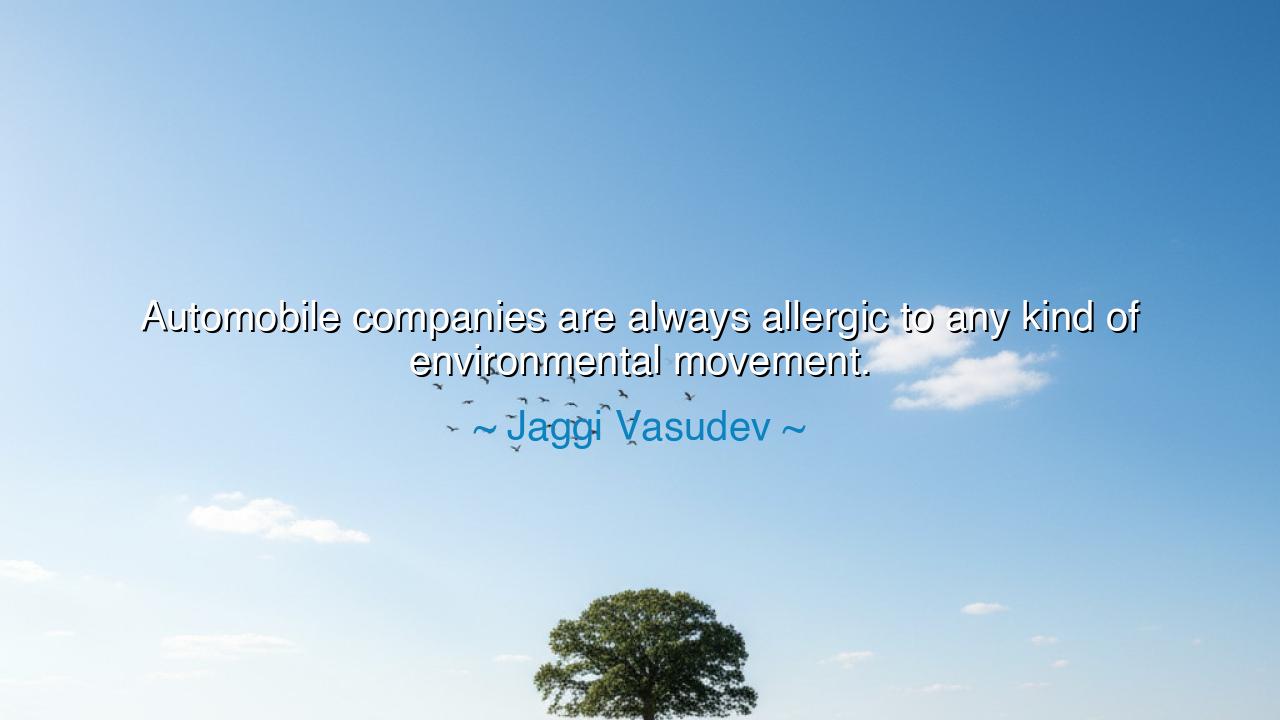
Automobile companies are always allergic to any kind of






Hear the piercing words of Jaggi Vasudev: “Automobile companies are always allergic to any kind of environmental movement.” In these words, there is no idle jest, but a sharp truth drawn from the dance of industry and ecology. For whenever profit stands at odds with conscience, resistance arises. And so it has been with the carmakers of the world, who from the birth of the automobile to this present hour, have often seen calls for cleaner air and gentler practices not as opportunities, but as threats to their dominion.
The meaning of this quote lies in the natural tension between industry and environmentalism. The automobile, symbol of freedom and speed, also became the harbinger of smog, oil spills, and poisoned skies. When voices rose demanding restraint—cleaner fuels, safer engines, fewer emissions—many companies recoiled as if struck. To them, each demand was not a step toward healing the earth, but an intrusion upon their profit and power. Thus Vasudev uses the word allergic, for their reaction has too often been defensive, hostile, as if to the very breath of environmental change.
History gives us examples both grave and instructive. In the 1960s, as smog choked Los Angeles, scientists and citizens began to demand change. The U.S. government proposed the Clean Air Act, requiring cars to meet emission standards. But the mighty carmakers resisted fiercely, claiming such rules would ruin their business, that technology was not ready, that the people did not care. Yet when forced, they discovered that innovation was indeed possible, and catalytic converters were born—devices that cleansed the breath of cities. What once was fought as impossible became standard, and the people lived longer because of it.
So too with the saga of electric cars. In the 1990s, California introduced rules pushing car companies to produce zero-emission vehicles. Automakers complied reluctantly, creating prototypes that thrilled consumers. But soon, under pressure from industry and oil giants, they recalled and destroyed these cars, declaring them impractical. The documentary Who Killed the Electric Car? tells this story of resistance. Yet decades later, as the world demanded change and pioneers like Tesla proved the market’s hunger, those same companies scrambled to return to the very path they once rejected. Vasudev’s words remind us: the allergy is not to technology, but to transformation.
The deeper wisdom here is that industries tied to old ways often see environmental movements not as allies, but as enemies. They cling to the past, fearing loss, instead of embracing the chance to build anew. Yet history shows that those who resist too long are left behind, while those who embrace change lead the future. Just as the horse-drawn carriage gave way to the automobile, so too must the automobile evolve toward harmony with the earth. What seems a threat is, in truth, an invitation to renewal.
The lesson for us is clear: do not be deceived by the protests of the powerful. When corporations declare that environmental demands are unrealistic, remember that they often said the same about safety belts, airbags, and clean fuels—until they were forced, and then they adapted. The people must not bow to fear, but insist upon the stewardship of the planet. For industry will follow where demand and law lead, and the allergy will pass when change becomes inevitable.
Practical action is within our reach. Support leaders who demand clean energy and sustainable transport. Choose vehicles that honor the earth, whether electric, hybrid, or simply fewer in number. Walk, cycle, or share when you can, remembering that each choice is a vote for the kind of future we build. And speak, always speak, for silence only strengthens resistance.
Thus let Vasudev’s words endure as both critique and counsel: automobile companies may resist, but the tide of environmental movements is unstoppable. For the earth herself demands change, and no industry, however mighty, can forever ignore the call of the wind, the river, and the breath of generations to come. The allergy will fade, but the truth of harmony will remain.






AAdministratorAdministrator
Welcome, honored guests. Please leave a comment, we will respond soon